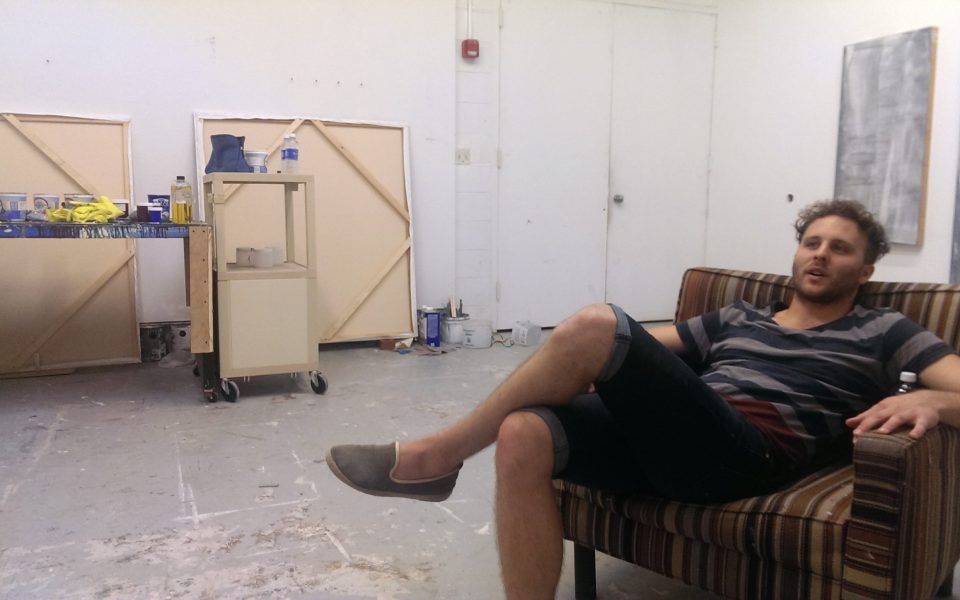by Sayaka Matsuoka
Canvases line the walls of the bright studio, interrupted only by a single guitar that hangs in the corner of the room. Empty paint buckets rest on the floor next to boxes brimming with tubes of paint. In the center of it all, Travis Phillips lounges in a striped, paint-splattered armchair. The studio, just off of Airport Drive in Chapel Hill, is his second home.
“This is my full-time job,” Phillips said.
But he understands well enough that many other creatives do not have the luxury of supporting themselves by making art. He hopes to change that, starting in Winston-Salem.
A native of the Camel City, Phillips grew up in Winston-Salem, worked and made connections with many of the city’s art organizations. He left to pursue soccer in college but always continued creating. He was previously the director of the graphics program at Sawtooth School for Visual Art and has collaborated with many other art programs in the city. Now he is pursuing an MFA at UNC-Chapel Hill and dreams of reinvigorating the arts scene in the Triad. His new project, Currentmaking, would help artists make money and fund an artist residency program, is finding support among some of the city’s art leadership.
“As the City of Arts & Innovation, we need to live up to that name,” Phillips said. “I studied the Winston-Salem arts scene. I started noticing some really significant gaps.”
He cites the lack of connection between the many organizations working independently in the city, a spirit of competition rather than collaboration. He believes that a strong culture begins with artists and businesses working together.
“A lot of organizations don’t have artists working for them,” Phillips said. “That’s a problem.”
He talks about biotech companies and businesses using artists to translate the language of their fields to the rest of the world using art.
His own work deals with many subjects including psychology, physics and math.
And he knows others who are also “pushing the right buttons.”
“We need to start participating in a larger conversation with the world at large,” he said. “We need to build an infrastructure that artists can survive in. We give back to the community but we have to be supported; it needs to be a reciprocal relationship.”
And while he may be an idealist, Phillips also has concrete ideas to start making a change.
Currentmaking was born out of the need to create sustainable and profitable lives for artists.
“A lot of artists work day jobs and people embrace the ‘starving artist’ mentality,” Phillips said. “That shouldn’t be the case.”
The project, which operates online, allows for six artists with local ties, including Phillips himself, to exhibit and sell their work to the world. While it sounds like a standard online gallery, the difference with this project lies in where the proceeds would end up. According to his plan, 50 percent would go to the artist and the other half would go to the arts council, which would use the money to create an artist residency in Winston-Salem. Devon MacKay, the director of major gifts of the Arts Council of Winston-Salem & Forsyth County, says that while no organization has stepped forward to begin the artist residency program, many have talked about it and it’s certainly something the arts council would love to see happen. And Phillips believes it to be vital for the transformation of the arts scene.
“[I]t could be a recipe for something great to happen,” Phillips said. “Artists need reasons to be ambitious, but it has to be sustainable.”
And he believes that the Triad area could fill a gap between artistic hubs like New York City and Los Angeles.
“There are a lot of motivated artists in Winston-Salem,” Phillips said. “We know what we want to say but we just don’t have the platform and the support.”
Join the First Amendment Society, a membership that goes directly to funding TCB‘s newsroom.
We believe that reporting can save the world.
The TCB First Amendment Society recognizes the vital role of a free, unfettered press with a bundling of local experiences designed to build community, and unique engagements with our newsroom that will help you understand, and shape, local journalism’s critical role in uplifting the people in our cities.
All revenue goes directly into the newsroom as reporters’ salaries and freelance commissions.




Leave a Reply